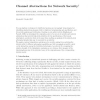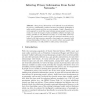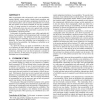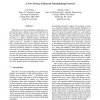123 search results - page 12 / 25 » Modelling the relative strength of security protocols |
MSCS
2010
13 years 5 months ago
2010
Abstractions for Network Security† MICH E L E B U G L I E S I, R I C C A R D O F O C A R D I Dipartimento di Informatica, Universit`a Ca’ Foscari, Venice. Received 6 October 20...
ATVA
2006
Springer
13 years 11 months ago
2006
Springer
Ping-pong protocols with recursive definitions of agents, but without any active intruder, are a Turing powerful model. We show that under the environment sensitive semantics (i.e....
ISI
2006
Springer
13 years 7 months ago
2006
Springer
Since privacy information can be inferred via social relations, the privacy confidentiality problem becomes increasingly challenging as online social network services are more popu...
CCS
2010
ACM
13 years 7 months ago
2010
ACM
Many cryptographic tasks and protocols, such as non-repudiation, contract-signing, voting, auction, identity-based encryption, and certain forms of secure multi-party computation,...
NDSS
2008
IEEE
14 years 1 months ago
2008
IEEE
Although several wide-spread internet applications (e.g., job-referral services, dating services) can benefit from online matchmaking, protocols defined over the past two decade...




